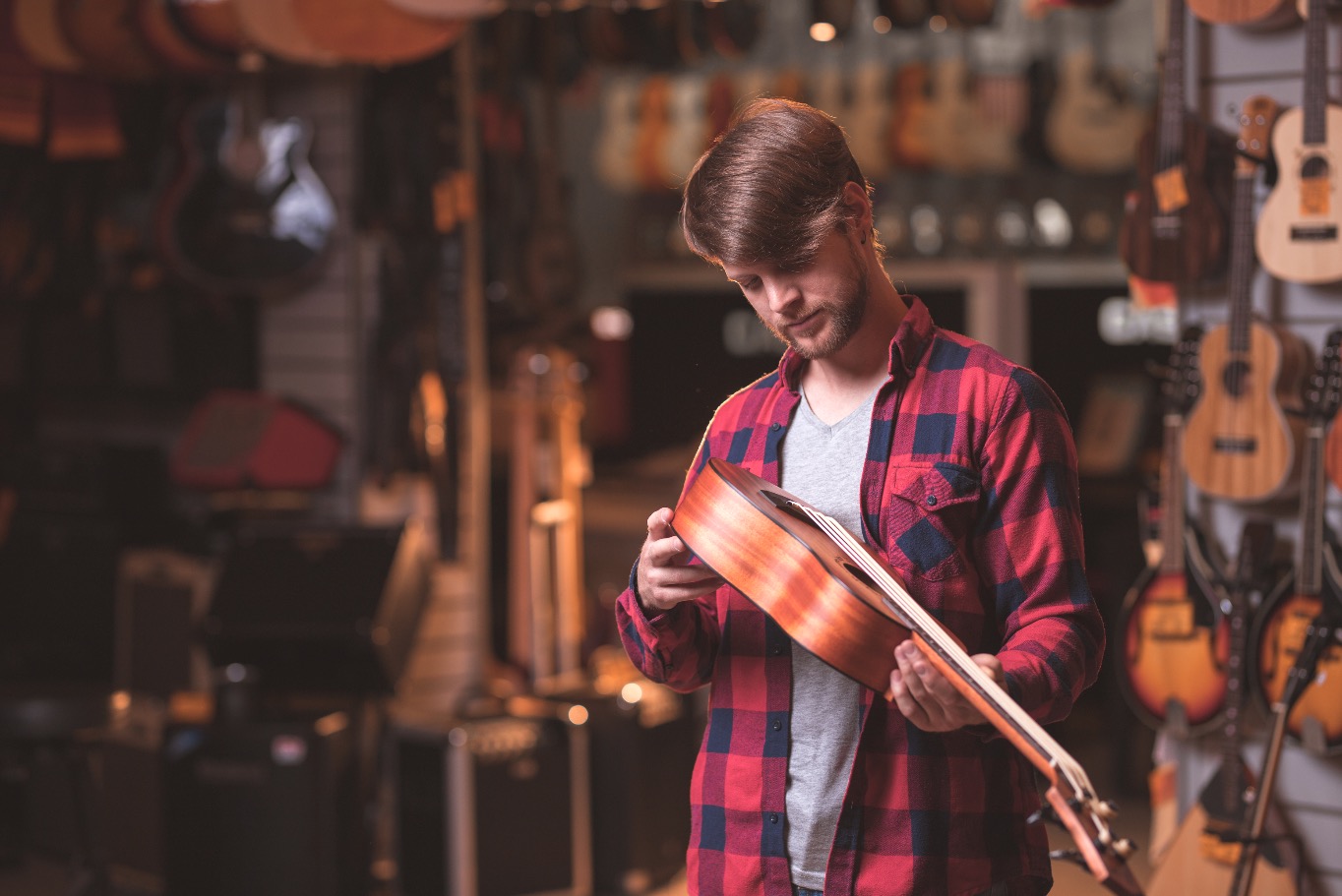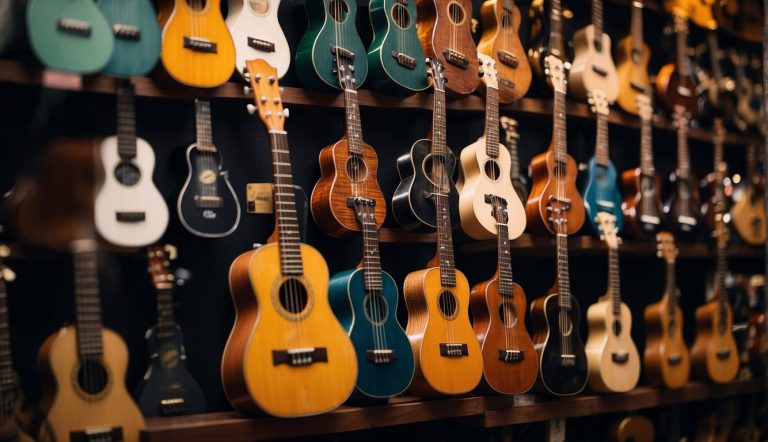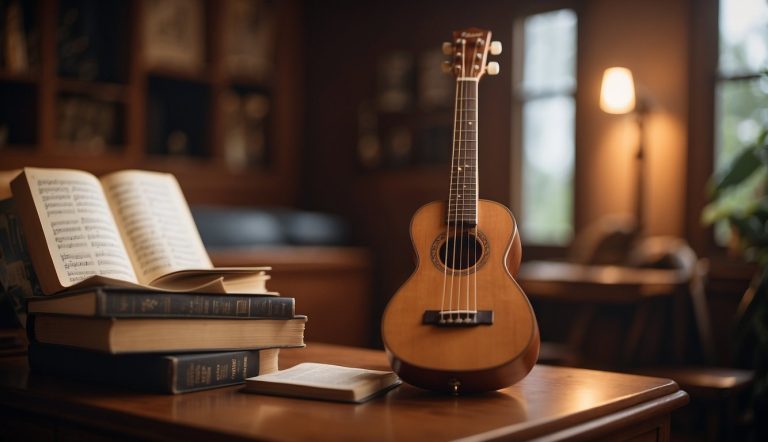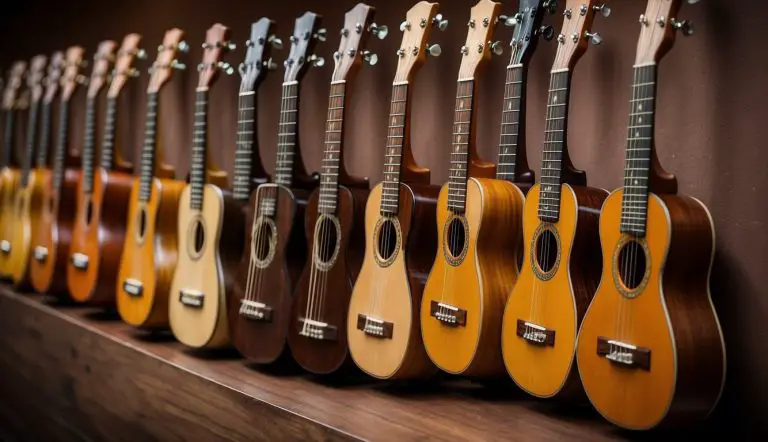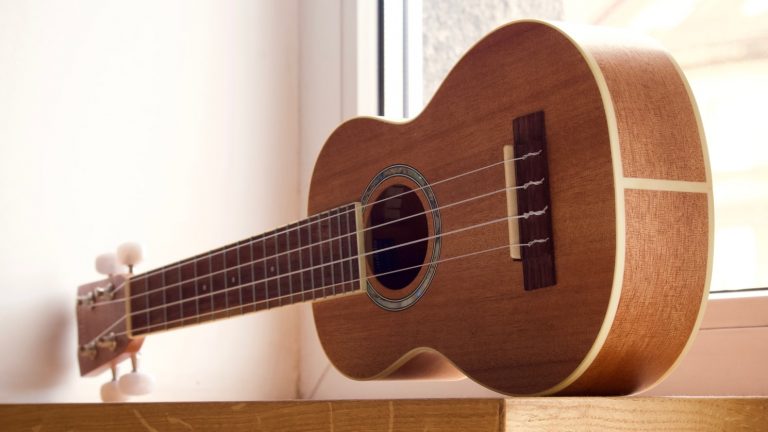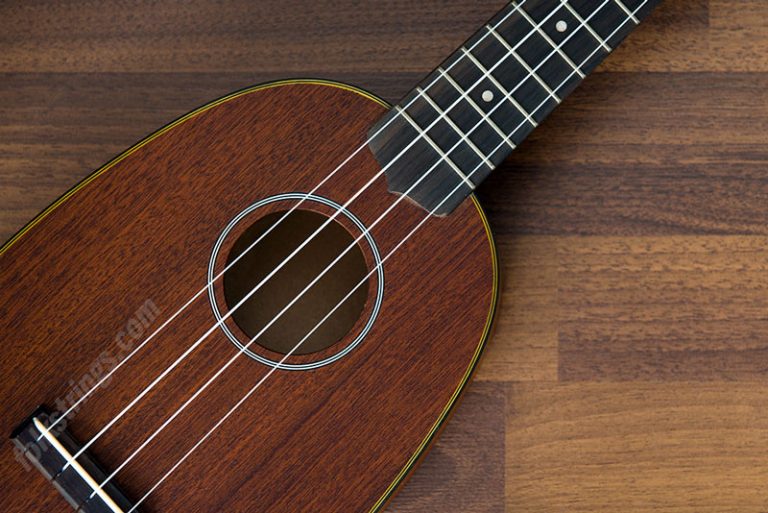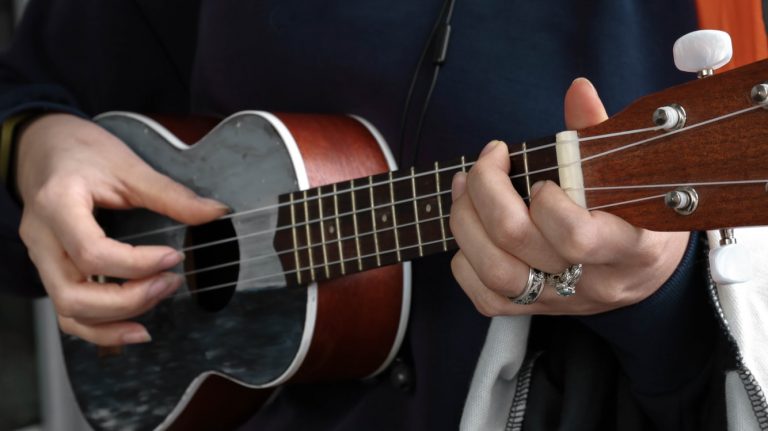Top 10 Tips – Buying a Used Ukulele – Things to Know
Folkstrings.com is reader-supported. When you buy through links on our site, we may earn a small commission.
Table of Contents
- Top (10) Tips for Purchasing a Used Ukulele
- 1. Play it first!
- 2. Check the fretboard.
- 3. Check for signs of previous repairs.
- 4. Check The Tuners.
- 5. Check For Bellying.
- 6. Check For Glue.
- 7. Check The Pickup.
- 8. Check The Strings.
- 9. Check The Wood.
- 10. Ask About The History.
- What Are The Pros And Cons Of Buying A Used Ukulele?
- What Are The Best Ukulele Brands?
- Buying A Used Ukulele – Conclusion
Multiple reasons lead people to buying a used ukulele. Perhaps they love to collect vintage instruments or they simply want to save money.
No matter the reason, it is imperative you understand the risks involved in purchasing any used instrument, but especially a ukulele.
Some things can go wrong, and it is important to know what you are getting yourself into before making a purchase.
When purchasing a used ukulele, you are safer going with a reputable dealer. No matter who you purchase from, it is important to know why the ukulele is being sold. Some unscrupulous sellers will try to hide the signs of damage that could be catastrophic to the performance of the instrument.
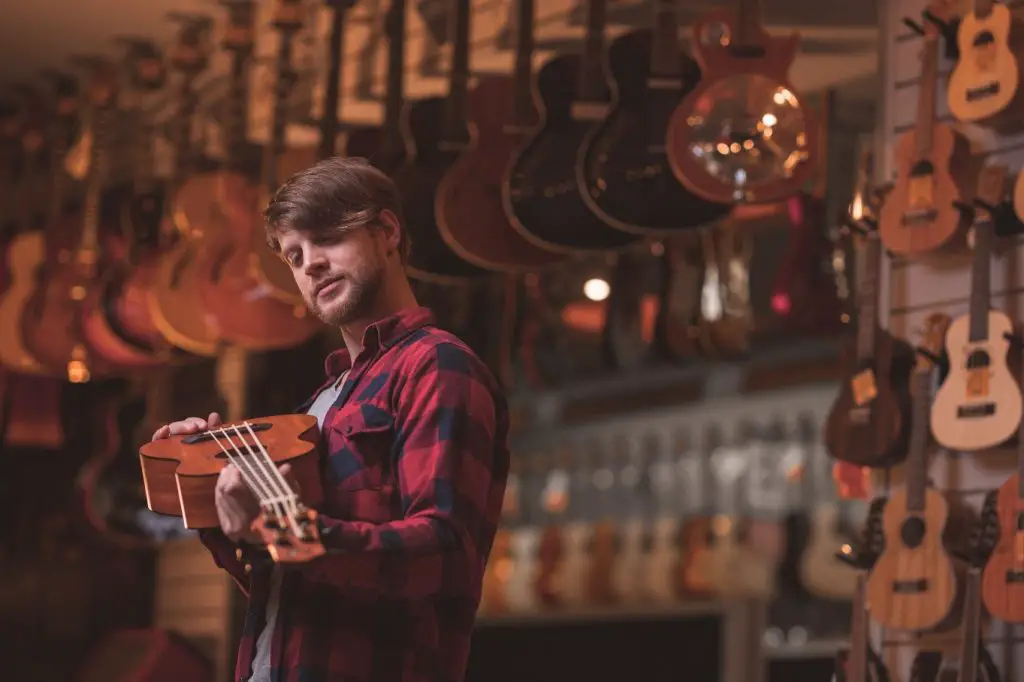
While it is normal and expected to see some wear, there must be no major damage. Check each fret and tuner carefully. Check the neck for cracks and signs of repair.
Ideally, it would be wise to purchase a used ukulele after playing it and checking every detail. If you are purchasing online, be sure to request multiple pictures that show up-close detail. You do not want to end up with buyer’s remorse. Before you decide to purchase a used ukulele, consider the following things that could go wrong.
- The tuners could be too old and damaged to hold intonation.
- The frets could be so worn they do not allow for proper fretting.
- The neck may be curved so that it is more likely to snap or is more difficult to play.
It is important to research the ukulele and determine its value before purchasing. You could end up over-paying for an instrument that is marketed as vintage, when in fact, it is just out of shape.
Top (10) Tips for Purchasing a Used Ukulele
Because buying a used ukulele is risky, it is important you know some tips that will ensure you purchase a used instrument that plays beautifully and has been taken care of over the years. With this top ten list of tips, you will feel confident making a purchase.
1. Play it first!
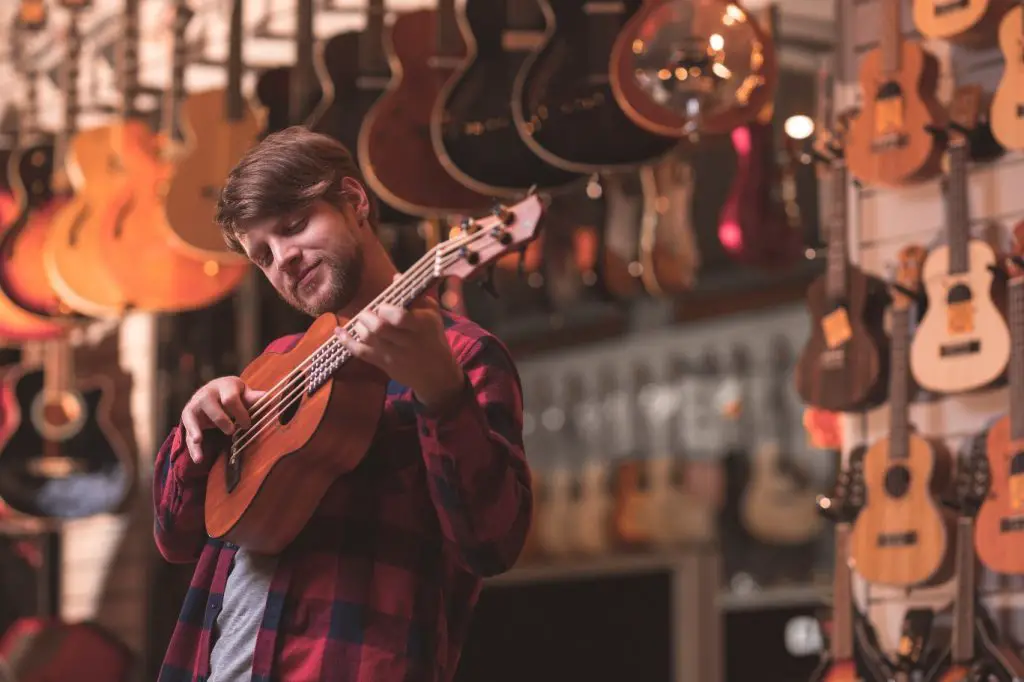
If at all possible, play the instrument before buying. You will need to play every single note on each fret and each string, to see if there are any dead spots. If the intonation is failing, do not purchase the uke.
Make sure there are no buzzing noises and the sound is rich and mellow. It is also wise to use a tuner to check the intonation. Unless you are an expert uke player, do not trust your ears alone!
2. Check the fretboard.
The fretboard is one of the areas that is going to offer telltale signs there are problems. If the instrument has been cared for and stored properly, the wood should be supple and smooth.
Cracks and peeling indicate the instrument has been stored improperly, with low levels of relative humidity. If a ukulele has been improperly stored, the following is likely to occur.
- The strings will be very close to the fretboard.
- There may be a hump on the fretboard where the neck joins the body.
- The strings are likely to create a buzzing sound when played.
- The sharp fret ends may extend beyond the neck.
It is important to make sure the neck is straight. If it is bowed, a truss rod may help. If the neck is warped, it will need to be replaced. Do not purchase a warped ukulele because the costs of repair can be expensive.
3. Check for signs of previous repairs.
You need to check for any signs of previous repairs done to the ukulele. If you find signs of repairs, you need to be sure an expert luthier carried them out. Inexperienced repair jobs can negatively affect the sound and make the instrument more vulnerable to future damage.
If you see cleats (repaired cracks), these can affect the sound quality, particularly if the repair was done by a novice. If you have access to the services of an expert luthier, you can sometimes have the repairs carried out again, with improvements to sound.
4. Check The Tuners.
The geared tuners should be smooth and not overly loose. They should not be cracked or missing. Note: if the uke is in otherwise excellent condition and plays well, the tuners are easy and fairly inexpensive to replace.
5. Check For Bellying.
Bellying occurs because of string tension. To check for bellying, look at the nut side. Does it dip down? Does the tail side bulge? If you see these signs, bellying has occurred. Not only does it make a ukulele look less attractive, but it can also cause structural damage.
If the bellying is not corrected, over time, the bridge can become unglued. This is something you want to pay special attention to when buying a used ukulele. Like other issues, bellying can often be repaired, but the expense may not be worth the purchase.
6. Check For Glue.

You will need to make sure all the seams are glued down and not coming loose. Check to make sure the neck is securely glued in place and does not wiggle. Check the bridge to make sure it is secure.
Also, look inside the sound hole and check for excessive glue residue around the seams. Sometimes, too much glue can affect the sound of the ukulele.
7. Check The Pickup.
If a pickup is installed, check for the following.
- Does the ukulele rattle when you shake it?
- Is the wiring installation neat or messy?
- Do all the strings come through equally on the pickup?
8. Check The Strings.
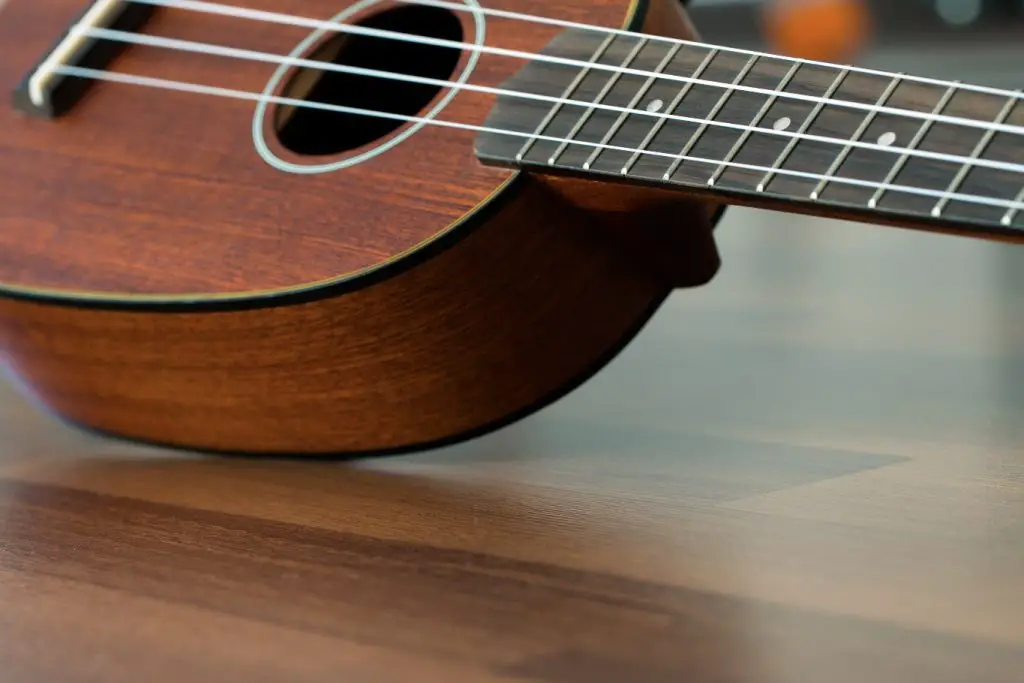
If the ukulele is stringless, you must insist on strings being installed before you purchase. You need to make sure the ukulele is tested thoroughly, and this is impossible to do without strings.
Should you find the installed strings are not producing a rich sound, you can always replace them. Remember, strings make a huge difference on ukuleles, even more so than on guitars.
9. Check The Wood.
If you look at the inside of the ukulele, the wood grain should be going in the same direction as the outside finish. If it is not, this likely means you have a laminate ukulele.
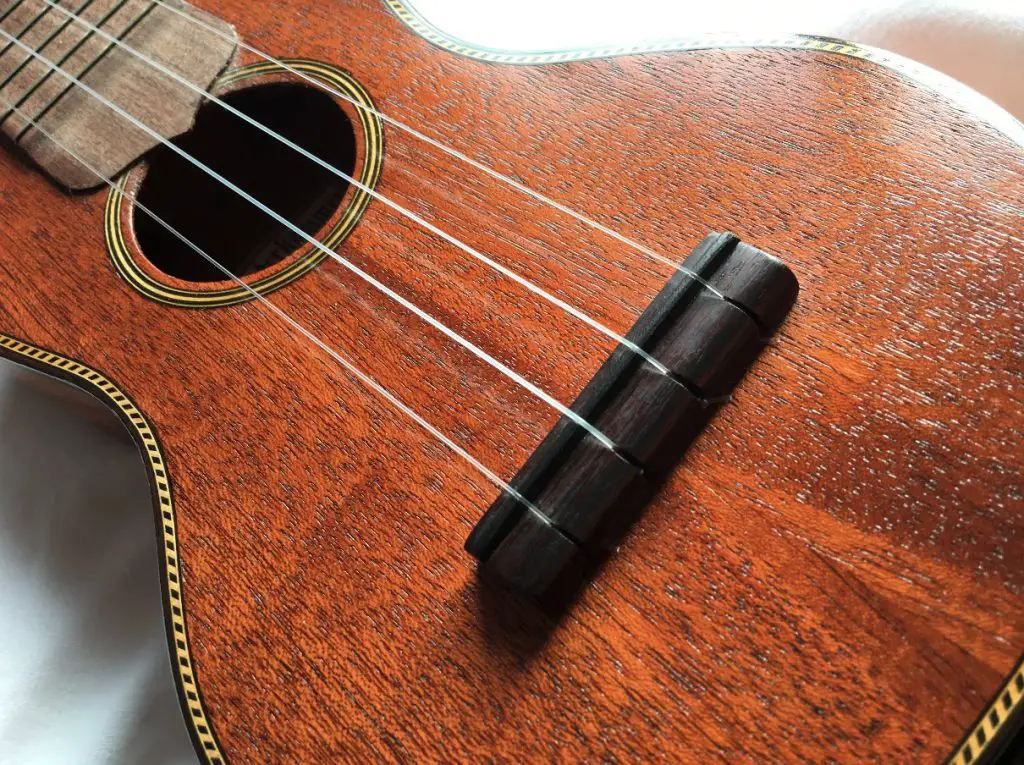
Laminate can become damaged easily over time and is more at risk for problems developing because of changes in humidity. Eventually, laminate will often begin to crack and peel.
10. Ask About The History.
As a buyer, you have the right to ask about the history of the instrument. How did the seller obtain the ukulele? How many owners has it had? Where was it stored? Be prepared to ask a lot of questions to learn as much as possible about the ukulele before you purchase.
What Are The Pros And Cons Of Buying A Used Ukulele?
As with any purchase of a used item, there are both pros and cons to buying a used ukulele. Knowing both allows you to make a wise decision that will lead to many years of musical bliss instead of buyer’s remorse.

Pros:
- One of the biggest pros of buying a used ukulele is saving money. Sometimes, you can get a nearly brand-new instrument at much lower prices because it is second-hand.
- If you see a worn fretboard, this means the instrument has been enjoyed often, which signifies it is a good one.
- You can buy vintage ukuleles that are rare and no longer being made.
Cons:
- If you have no way to play the instrument, you could end up buying a poor-quality ukulele.
- Unscrupulous sellers can sometimes disguise the signs of damage.
- Without research, you could end up falling for a scam.
What Are The Best Ukulele Brands?
Whether you are a beginner or pro, there are some brands of ukuleles that are superior to others. Consider the following if you are on the lookout for the best brands.
- Kala. They are easily one of the best makers on the market. They focus on ukuleles only.
- Luna. They are known for their beautifully artistic ukuleles.
- Magic Fluke. They have been producing beautiful ukuleles since 1999.
- Lanikai. They are an innovative company that specializes in all things ukulele.
- Martin. While they are better known for their guitars, they also produce amazing ukuleles.
You cannot go wrong with any of the above instrument manufacturers. When purchasing a used ukulele, no matter the brand, research is necessary.
Buying A Used Ukulele – Conclusion
Buying a used ukulele can seem intimidating, especially if you are not prepared. Now, you should be armed with the information that is necessary for making the best purchase.
Buying a used ukulele can save you a lot of money and allow you to get a better instrument with your budget. You can even discover some amazing vintage finds that will be a perfect addition to your collection.
By following the above tips, you can rest assured the used ukulele you buy will be one that offers beautiful music and durability. By taking time in the process and researching as much as possible, you can avoid buyer’s remorse.
Author Profile
-
Daniel Johnstone is an English writer with a love for stringed instruments from around the world.
He shares his love for these instruments through his writing for folkstrings.com, a website dedicated to all things related to folk string music.
Daniel's passion for music started at a young age, and he has since become an accomplished musician, playing guitar, cavaco, and recently, the harp.
His dedication to learning and sharing his knowledge of stringed instruments is evident in his insightful and engaging blog posts. Whether you're a seasoned musician or a beginner, Daniel's writing is sure to inspire and entertain you.
When he's not playing music or writing, you can find Daniel exploring new instruments and seeking out new sounds to share with his readers.
Latest entries
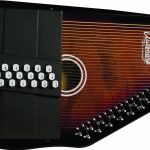 AutoharpApril 4, 2024What Is the Autoharp Made Of: Exploring Its Materials and Craftsmanship
AutoharpApril 4, 2024What Is the Autoharp Made Of: Exploring Its Materials and Craftsmanship AutoharpApril 4, 2024Is Autoharp Easy to Play? Unveiling the Truth for Beginners
AutoharpApril 4, 2024Is Autoharp Easy to Play? Unveiling the Truth for Beginners AutoharpApril 4, 2024What Is an Autoharp Worth? Your Guide to Pricing and Value
AutoharpApril 4, 2024What Is an Autoharp Worth? Your Guide to Pricing and Value AutoharpApril 4, 2024Are Autoharp and Zither the Same Thing? Unraveling String Instrument Myths
AutoharpApril 4, 2024Are Autoharp and Zither the Same Thing? Unraveling String Instrument Myths
Affiliates:
This post may contain affiliate links that at no additional cost to you, the site may earn a small commission. We only recommend products we would use ourselves and all opinions expressed on this site are our own.
Accuracy Advice:
While we strive to provide up-to-date and accurate information, the content in this article may not reflect the most current research or medical guidelines. We encourage readers to do further research and consult with professionals for more personalized advice.
Our Recommendations:
The products and services mentioned in any of our articles are recommended based on our independent research and personal experience. We are not sponsored by any company. We aim to suggest products and services we believe are of high quality and could be beneficial to our readers.

